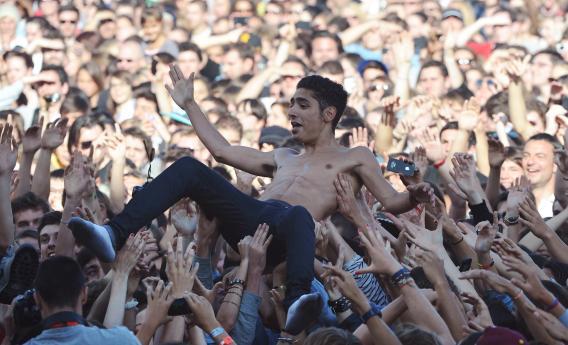At first sight, hedge funds don’t share a lot with rock music festivals. But both are subject to the law of large numbers. Festivals like Pickathon, a three-day concert taking place outside Portland this weekend, are limiting entry to make the experience less mundane. And the likes of Moore Capital Management’s Louis Bacon are seeking better-than-average returns by shrinking, too.
Connecticut-based Bacon, whose fund firm invests some $15 billion of his own and clients’ money, is much more likely to be found on his Scottish estate or the slopes of Aspen than in the Oregon woods. But he might find some common ground with Pickathon’s organizers. He just decided to hand back $2 billion of the money his firm oversees to investors. He felt he wasn’t able to make big enough returns in the current environment.
The difficulty of maintaining better-than-normal returns, festival experiences or growth as a concern gets larger is a widespread phenomenon. It’s the same for giant companies like Apple and burgeoning economies like China’s. It’s arguably a narrower problem for hedge funds and festivals, though. Hedgies have a finite number of strong investment ideas and a limited universe of securities in which to deploy their cash. And concert promoters can only book so many bands at a time.
At a certain point, the alternative to becoming run-of-the-mill is to shrink. Bacon hopes to deliver better percentage performance with less money to put to work. He’s not alone in the investing world. Howard Marks of Oaktree Capital has long had only a limited appetite for new money. Stanley Druckenmiller in 2010 decided to stop managing money other than his own, saying $10 billion was about his limit. Brevan Howard, a London-based fund firm, returned some cash to investors last year and other hedgies, including Paul Tudor Jones, Steven Cohen and Daniel Loeb have stopped taking new investment.
For Pickathon, shrinking is more about exclusivity. The event’s organizers cap the number of tickets sold at around 3,600 daily so that artists and fans alike can mingle and take in 50 eclectic musical acts on six stages. The limit on attendance keeps the experience special, explains co-founder Zale Schoenborn, an Intel microprocessor architect by day. Capping the number of tickets has allowed Pickathon to raise the cost of a three-day pass by about a third to $200.
It’s far from a direct analogy with a hedge fund like Bacon’s. But the lesson is similar: For businesses that want to stand out, whether in finance or rock music, less can be more.
Read more at Reuters Breakingviews.
